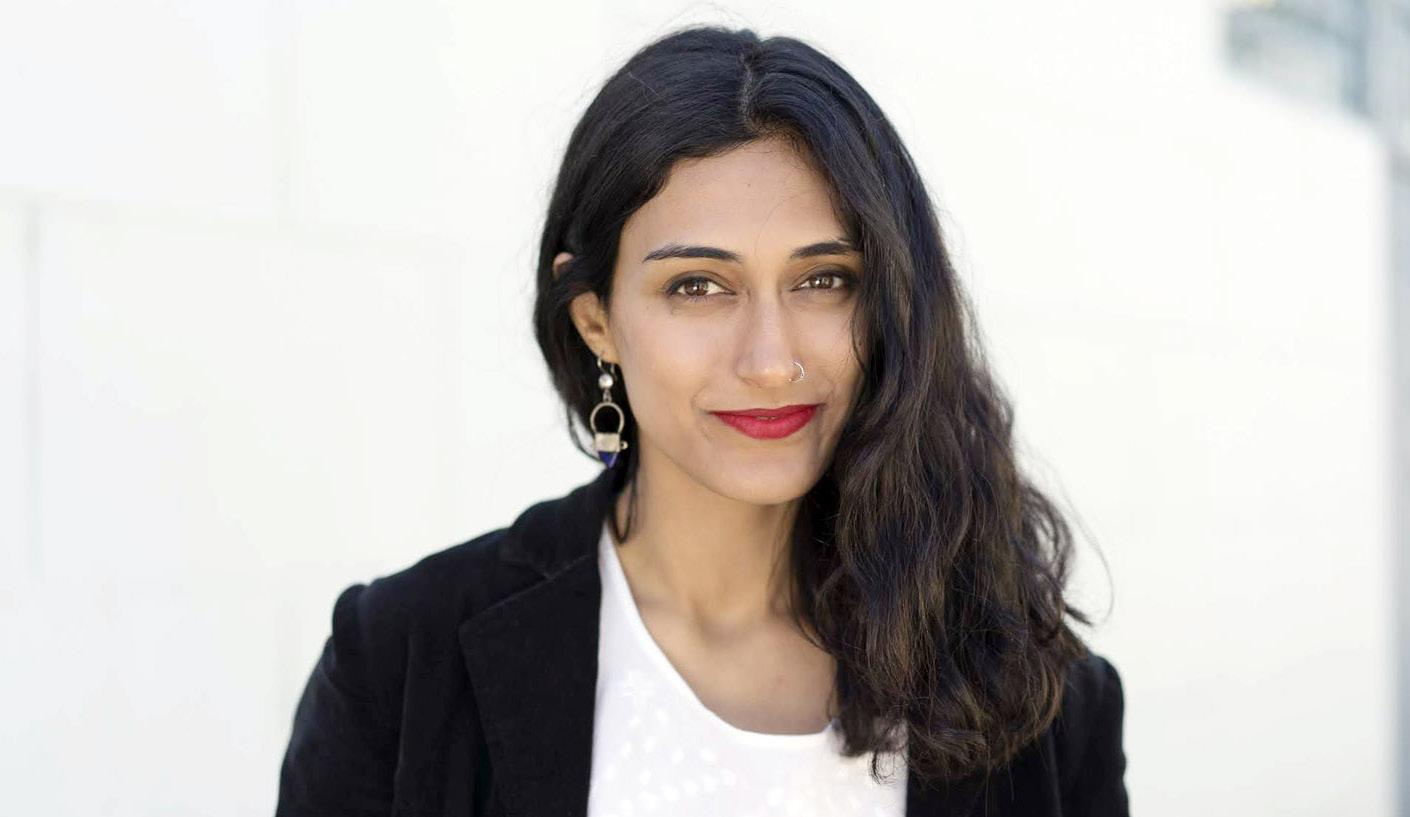
17 minute read
A different kind of isolation
from 2020-05 Sydney
by Indian Link
An epic marine adventure: Sydney girl Divya Gordon, an extreme sports enthusiast, spends three months isolating at sea
BY RITAM MITRA
It is said that the danger of adventure is worth a thousand days of ease and comfort. It’s a philosophy that has long driven Divya Gordon, a videographer and producer who recently set sail on a three-month long expedition in the hope of finding and capturing some of Australia’s most remote marine locations. Exploring the most beautiful untouched parts of the region with a small group of adventurers and filmmakers, Divya’s escape into isolation has been equal parts dramatic and unlikely.
Divya describes hers as a “classic Indian story”, though over time it has rapidly transformed into one that is anything but typical. After graduating from Pymble Ladies College in Sydney’s north shore, where she excelled in visual arts, Divya was strongly encouraged by her father to study business at university. Despite aspiring to study political economics and arts, Divya followed her father’s advice to complete a commerce degree at UTS, and looks back on university as a ‘miserable’ affair. “It was the most unfulfilling thing ever having to study business and knowing it wasn’t me,” she says.
Starting out as a qualitative researcher, Divya admits it took some time to come to grips with her reality. “I really struggled in the corporate world when I was younger. I reached a point where I realised that this is my life, and this isn’t where I want my mind to develop. It was always niggling in the back of my mind that when I gain enough clout in [the business] world, I want to try and do something for myself”.
Divya’s dream became clear: to combine her penchant for creativity and adventure with her passion for altruism.
A Fresh Start
“I’m a little bit wild,” laughs Divya, an avid fan of extreme sports. “I don’t like working in an office 9 to 5. I like my autonomy and I much prefer the instability of that to having to go into an office every day.” It’s a creative streak that runs in the blood, with artists and musicians scattered across Divya’s extended family.
After an initial tilt at a new career in Spain in 2017 (which she now labels as a “terrible” idea), Divya returned to
Sydney and began seeking volunteer work to further develop her photography and videography skills, including “eyeopening” experience with the Asylum Seeker Resource Centre. That cause was particularly close to Divya, whose grandparents on her mother’s side were Sindhi refugees during Partition in 1947.
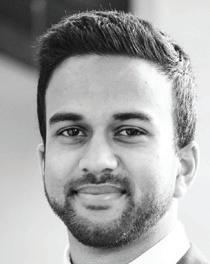
As work started rolling in, Divya was soon supporting herself solely through her film and videography work, despite never studying it. “It’s a dynamic, amazing, constantly evolving industry,” she remarks. “It’s really subjective. The point is to have a mind that doesn’t just deal in business – I need to reframe my mind, exist in the world, take stimulus and just create. Film is really unique for that.”
Divya’s interest in film and her reputation for adventure led to an invitation that would change her life.
The Expedition
Enter Dean Cropp, an award-winning cinematographer and producer known as the Barefoot Captain, who has made a name capturing and producing ocean adventure content and whose videography skills Divya anoints as “unlike anyone else when it comes to shooting what he’s shooting”. Dean’s latest project is a threemonth long sailing expedition following in the footsteps of his adventurer father, chasing the most remote marine locations and capturing every minute of the journey.
Divya was invited to join this expedition as a cameraperson and assistant editor on just two days’ notice. In a twist of fate, the invitation came as the impacts of the COVID-19 pandemic were beginning to ravage Divya’s upcoming videography jobs, with weddings, international conferences and other events being universally cancelled.
The prospect was three months at sea with scant food, bouts of seasickness, rolling cameras and poor sleep – all with six (mostly) strangers. It’s the stuff of nightmares to many, yet for Divya, who had never even dived before, it was a no-brainer.
“It was earth shattering, one of the most life-changing adventures you could ever imagine”, she says. “It’s incredible to have now swam with sharks and seals and stingrays, innumerable creatures. It’s a whole other world. Even at night, looking out at the stars and the water, it’s like you’re in the middle of the universe. You don’t know where the sky ends and the water begins.
“And the weightlessness of diving – just imagine walking through 3D space and gravity is suspended, and you can move in any direction. But it’s also terrifying, because anything can come up at you from any direction.” Divya and her crewmates experienced that terror when, while diving and shooting in open waters, they sighted a tiger shark, which later bit the back of the boat once they were back aboard.
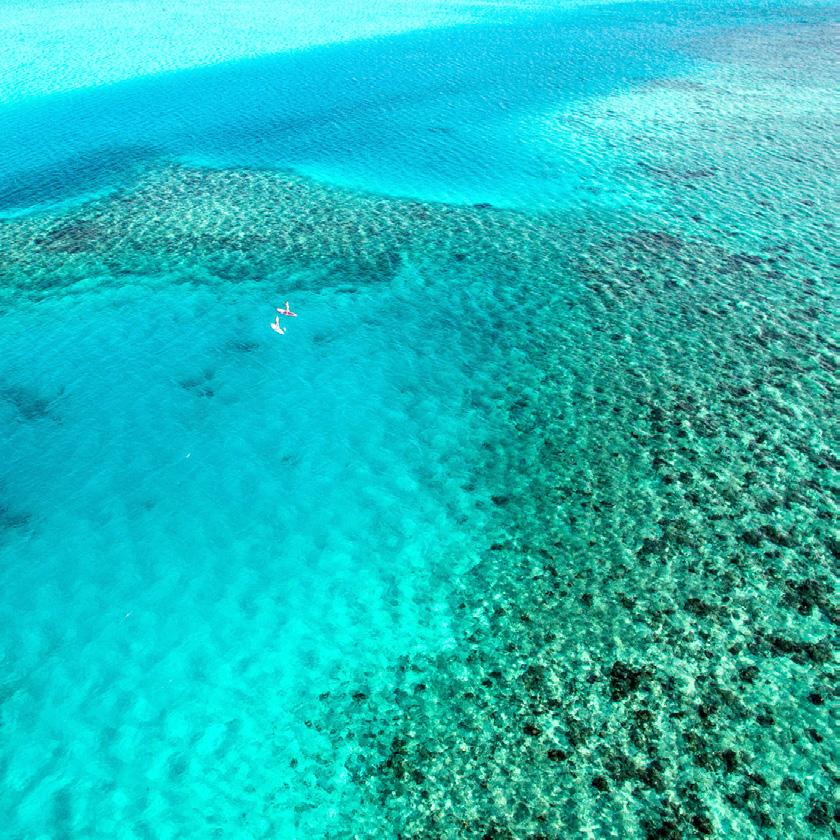
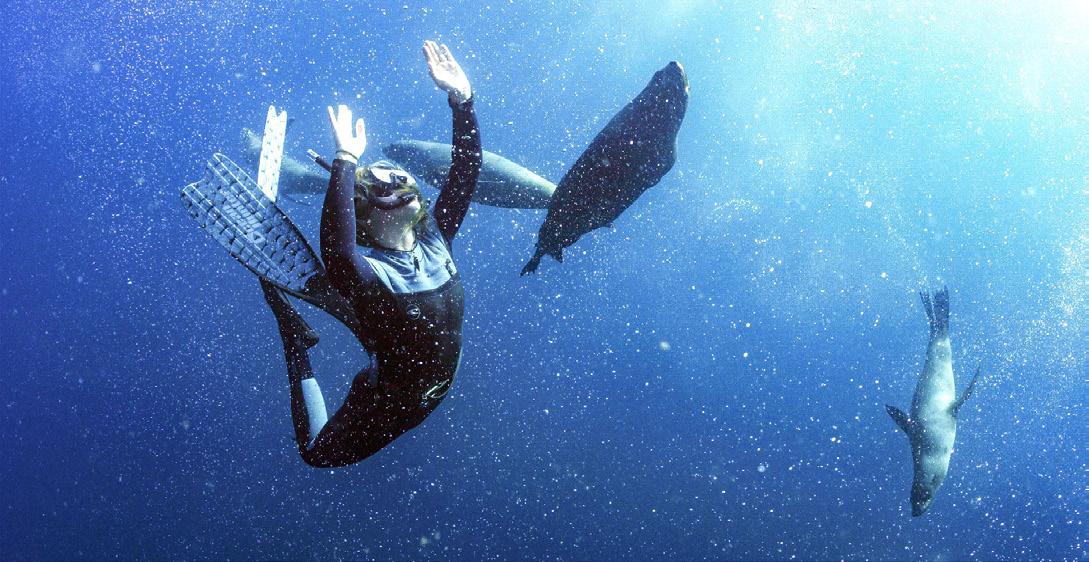
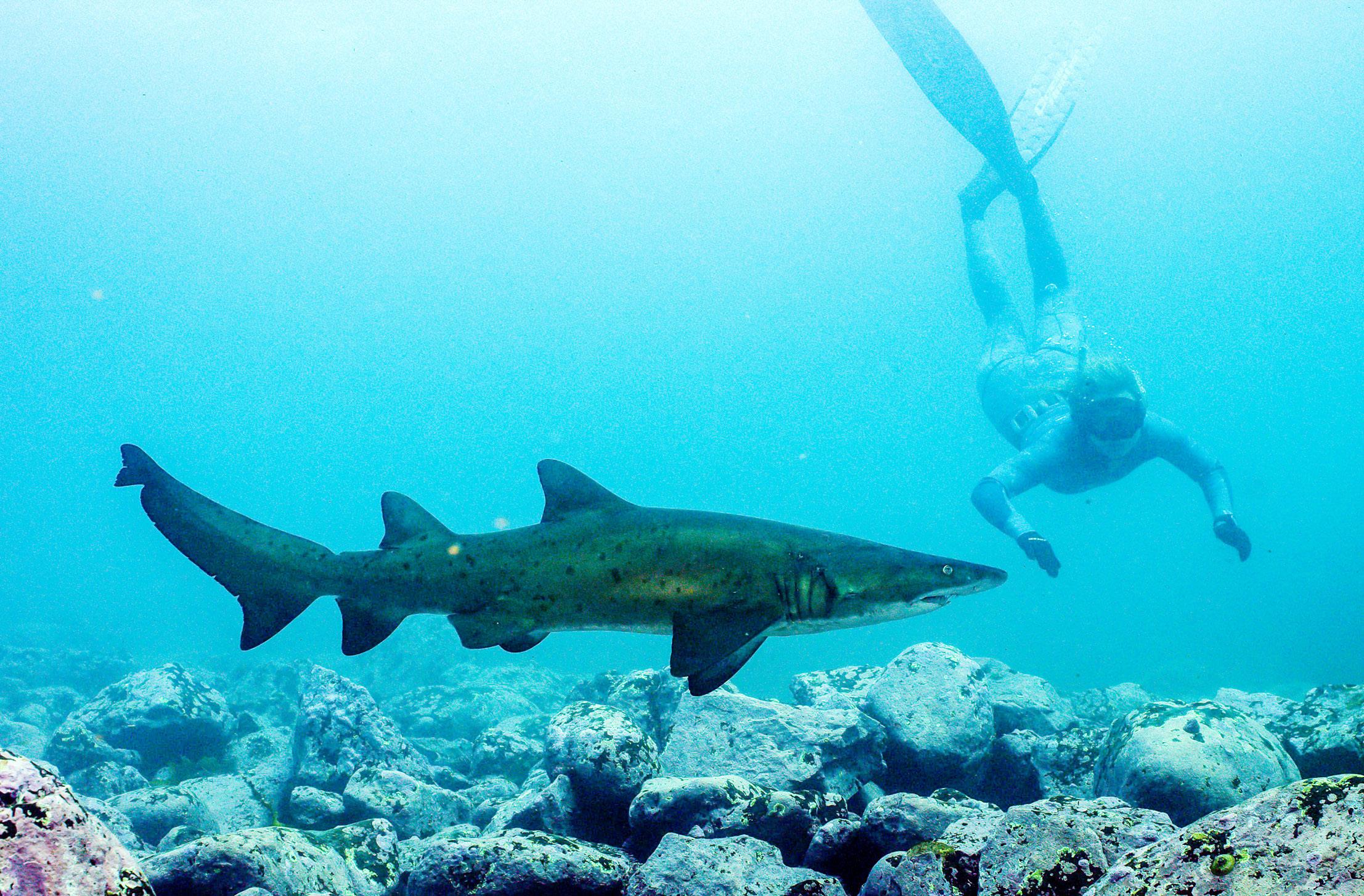
“Getting back in the water after that was terrifying. I was thinking, ‘Can I really do this?’ But we were back in the water the very next day,” she says.
A Different Kind Of Isolation
As the rest of Australia isolated at home, so did Divya and her crewmates, albeit adrift and alone at sea. While their isolation was idyllic in some ways, it came at a cost.

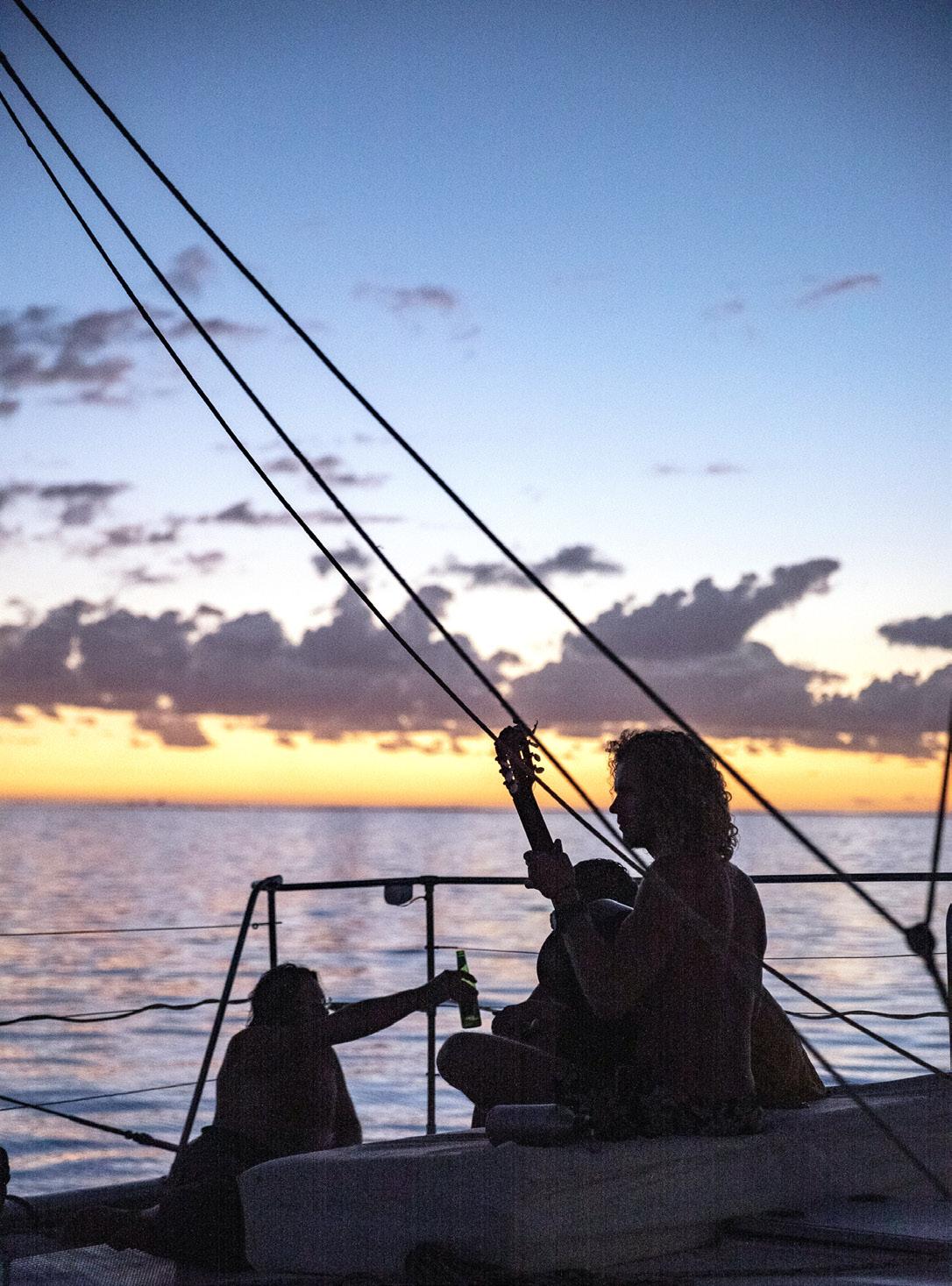
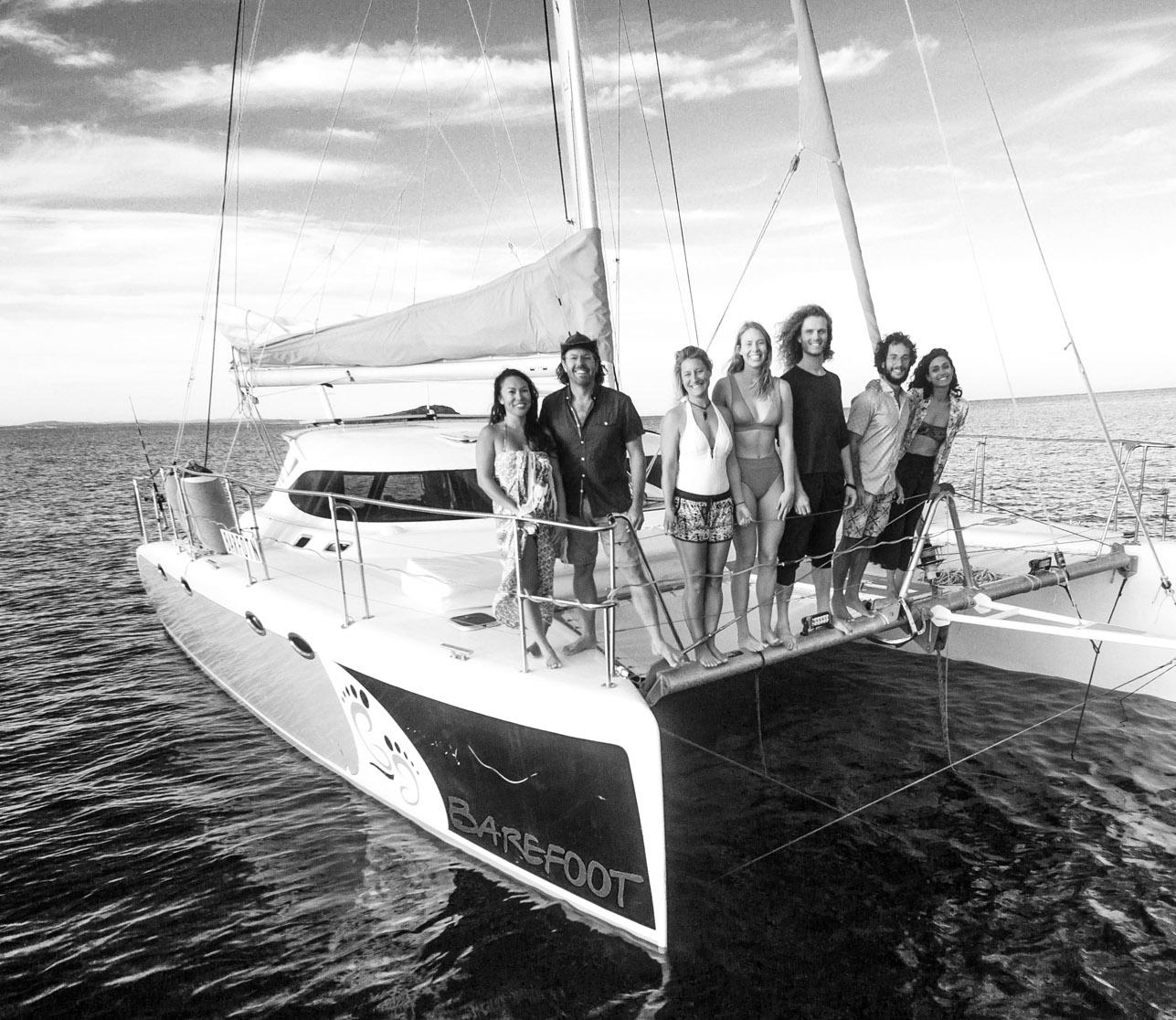
“There’s a sense of security I didn’t realise I was missing. We took turns being helmsmen [steering the boat]. We were doing early morning and late-night shifts, so sleep was always interrupted, and it turns into a bit of a nightmare. We also had to be frugal with our water usage. When I cooked curry everyone’s reaction was so bad – curry is great, but when you’re barely stomaching normal food, it’s not great! You get very sick, and seasickness makes you almost comatose for days.”
Divya notes, “There was a survival element to our isolation. We ran out of fresh food in the first two weeks, and we had frozen food, but that ran out in the last week, so we were down to just canned food. We also fished for fresh fish. That survival element bonds you to the people you’re around - you prove to yourself that you can go without, and that you can go a little bit further than other people go. It’s incredibly empowering and connecting”.
The things Divya missed most from solid ground? Fresh bananas (given the strict no bananas on board policy), and the ability to walk more than 10 metres in a straight line.
A Sense Of Perspective
Divya reflects on her experience with an acute sense of self-awareness and perspective that often accompanies adventure, expressing particular gratitude to Dean Cropp, Wesley Nelson, Louis Piazz and The Story Mill. “I am so lucky. Being a freelancer is a struggle and honestly it still is, but experiences like this enrich me far more than money and a traditional career could. It’s been incredible to have this opportunity and create something out of it. Working with different kinds of camera angles, different types of cameras – it’s creation on the fly, you have to create a story and make something consumable.”
While Divya’s mother – a lawyer who Divya describes as “very creative” herself – has always been hugely supportive of Divya’s ambitions, Divya’s father has also started coming around on her career change. “I give Dad the best stories to share with his golf buddies,” laughs Divya. “He’s concerned for me and that’s where the struggle comes from. It’s about proving to him and to myself that I’m trying to be sensible in life, and that it’s going to be worthwhile. I know he’s proud.”
Divya concludes with some simple career advice: “Just back yourself. You have nothing to prove to anyone but yourself. You have to decide for yourself what you want to do with your 9 to 5, and if it’s not what you’re currently doing, move on and don’t look back”.
Episodes featuring Divya’s expedition can be found at: www.youtube.com/barefootcaptain
Instagram @barefootcaptain
Indian-American father-daughter doctor duo taken by COVID-19
Two Indian-American doctors, a father and daughter, have died of COVID-19 after contracting the disease while treating infected patients in New Jersey, USA. Dr Satyendra Dev Khanna and Dr Priya Khanna were hailed by New Jersey Governor Phil Murphy for their selfless dedication in caring for others.
Murphy said that the Dr Khannas “dedicated their lives to helping others and we lost both of them to COVID-19”. They were part of a family of five doctors, and Murphy said of the three survivors, “I hope that the fact that our entire state mourns with them is some small comfort.”
Satyendra Khanna was a pioneering doctor and was among the first surgeons to perform laparoscopic surgery in New Jersey, the Governor added. He had worked as head of surgical departments for decades at several hospitals and died at Clara Mass Medical Center where he had worked for more than 35 years, Murphy said.
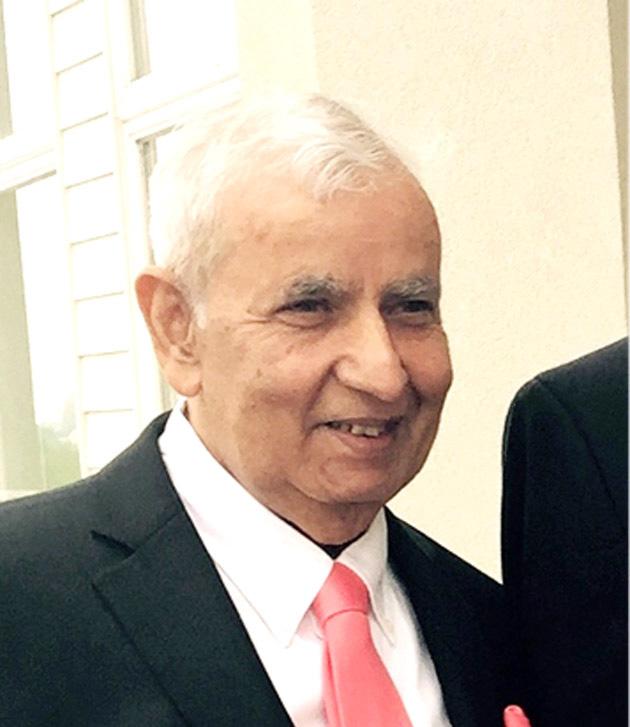
The 78-year-old had graduated from Maulana Azad Medical College in New Delhi in 1964. His colleagues remembered him as “a gentle and caring physician”.
According to Kaiser Health News, Priya Khanna’s sister had put out an appeal on Twitter: “Plasma donor needed urgently for my beautiful young sister who dedicated her life to helping others,” and a donor was found within a day. But she died on April 13 and her father followed on April 21.
Priya Khanna, 43, was a nephrologist, who had received her medical degree from Kansas City School of Medicine in 2003. Murphy said that she was the medical director at two dialysis centres and also trained doctors.
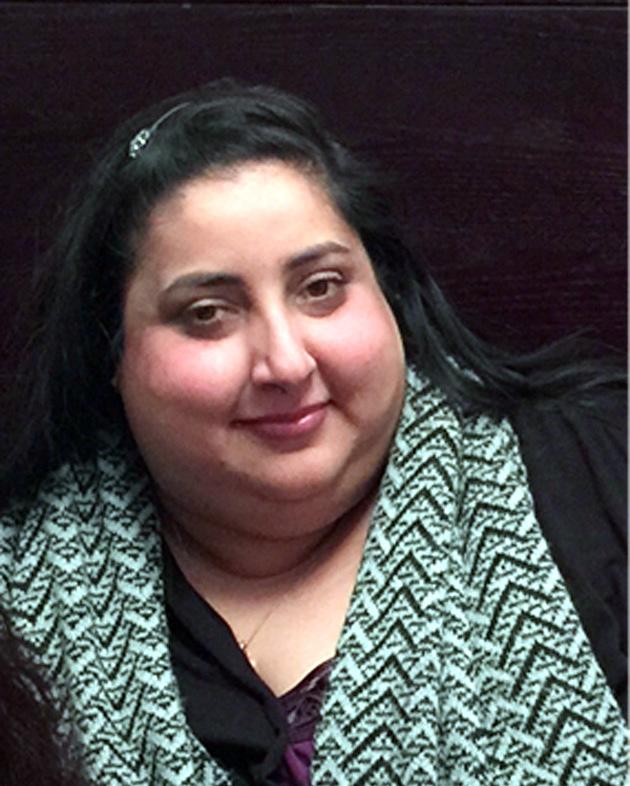
He said she was “taking pride in teaching the next generation of doctors. And it should be noted that the ICU (intensive care unit) physician who cared for her was trained and taught by her as well. Priya will be remembered as a caring and selfless person who put others first.”
Murphy said that he had spoken to Komlish Khanna, the wife of Satyendra Khanna, to condole their deaths.
Two other daughters of Komlish and Satyendra Khanna are also doctors.
Sugandha Khanna is an emergency doctor, and Anisha Khanna is a paediatrician.
DRDO develops devices to sanitise phones, currency notes
The Research Centre Imarat (RCI), a premier laboratory of Defence Research Development Organisation (DRDO), has developed an automated contactless UVC sanitising cabinet. It can sanitise mobile phones, iPads, laptops, currency notes, cheques, challans, passbooks, and paper.
RCI developed the Defence Research Ultraviolet Sanitiser (DRUVS) as part of the DRDO based in Hyderabad. DRDO said that DRUVS Cabinet has a contactless operation which is very important to contain the spread of virus. The proximity sensor switches clubbed with drawer opening and closing mechanism makes its operation automatic and contactless.
The DRUVS provides 360-degree exposure of UVC to the objects placed inside the cabinet. Once the sanitisation is done, the system goes in sleep mode, hence the operator need not wait or stand near the device, said a statement.
RCI has also developed an automated UVC currency sanitising device called NOTESCLEAN. Bundles of currency notes can be sanitised using DRUVS, however disinfection of each currency note using it, will be a time-consuming process. For that purpose, a sanitising technique has been developed, where one has to just place the loose currency notes at the input slot of the device. It picks the notes one by one and makes them pass through a series of UVC lamps for complete disinfection, it said.
Rating India’s COVID tracker app: MIT Tech Review
India’s AarogyaSetu tracker app has been given 2 out of 5 points by researchers at MIT Technology Review who compared the COVID-19 tracker apps of 25 countries. The findings of contact-tracing apps were based on their enforcement, handling of data, privacy and transparency dynamics across the world.
The Aarogya Setu app currently has nearly 100 million users. It scored positively on the timely deletion of user data and collection of only useful data but "failed to score on voluntary use, limitations of data usage, and transparency", said MIT Technology Review. Their database shows that India's app is unique in a number of other ways, too.
"Many countries are developing limited services that use Bluetooth or GPS to give ‘exposure notifications' to people who have interacted with someone found to have COVID-19. India's app, though, is a massive all-in-one undertaking that far exceeds what most other countries are building," said the report.
AarogyaSetu also offers access to telemedicine, an e-pharmacy, and diagnostic services. It is whitelisted by all Indian telecom companies, so using it does not count against mobile data limits.
Earlier this month, the app’s developers assured users that it is completely safe while reacting to an ethical hacker's claim that a security issue has been found.
Niti Aayog CEO Amitabh Kant said that AarogyaSetu has alerted the government about more than 650 hotspots across the country which could have been missed otherwise.
Kant also claimed that the app, which has now been made mandatory for all government employees, alerted them about 300+ emerging hotspots which helped the government take swift action.
AarogyaSetu is a COVID-19 tracking mobile application developed by the National Informatics Centre (NIC) that comes under India’s Ministry of Electronics and Information Technology.
Three Indian photojournalists win Pulitzer Prize for J&K news coverage
Three Indian journalists of the Associated Press have been awarded the 2020 Pulitzer Price for Feature Photography. They won for their coverage of Jammu and Kashmir after its special status under Article 370 of the Indian Constitution was revoked last year.
The names of the prize winners Dar Yasin, Mukhtar Khan, and Channi Anand were announced virtually by Pulitzer board administrator Dana Canedy in a livestream on Youtube. They were commended for “revealing the turmoil and plight of the Kashmiri people”.
others for COVID-19.
While Yasin and Khan are journalists based in Srinagar, Anand is based in Jammu. Their news coverage included images of protests, police action, and daily life in Jammu and Kashmir. AP’s president and CEO Gary Pruitt called their work “important and superb”, thanking them for giving the world a glimpse into the struggle in the region.
“Thank you colleagues, friends, brothers. I would just like to say thank you for standing by us always. It is an honour and a privilege beyond any we could have ever imagined. It is overwhelming to receive this honour," said Yasin on Twitter.
In a statement by the news agency, they described the struggles of reporting in Jammu and Kashmir when phone and internet services were shut down. They explained that they had to sometimes hide cameras in vegetable bags and ask travellers to carry out photo files with them to submit to the agency’s office in New Delhi.
Omar Abdullah, former Chief Minister of Jammu and Kashmir congratulated them on Twitter: "It's been a difficult year for journalists in Kashmir & that's saying something considering the last 30 years haven't exactly been easy. Congratulations to @daryasin, @muukhtark_khan& @ channiap on this prestigious award. More power to your cameras.”
The Pulitzer Price is considered the most prestigious award in the field of journalism. Other winners in the photojournalism category this year include Reuters’ photography staff for their coverage of the Hong Kong protests.
365 poems, 279 poets, 34 languages in Gulzar's 'A Poem a Day' magnum opus
This truly is a litterateur's delight, as Gulzar, one of India's leading poets, as also a highly respected script writer and film director, serves up a treasure trove of 365 poems, one for every day of the year, written by 279 poets in 34 languages written over the seven decades of Independence and appearing in English and Hindustani. He describes it as his "tribute" in the "difficult times we are going through", to the "many languages of India that happen to be local yet form a part of our national identity".
The selection in the humongous 976-page A Poem a Day, to be published by Harper Collins in July, has been personally chosen by Gulzar himself, and features the works of poets from the north, south, west and east of India, as well as the northeast, Sri Lanka, Bangladesh, Nepal and Pakistan, presenting kaleidoscopic view of history, human experience and poetic expression since 1947.
The book began "as a thought - why not have a poem to read for every day of the year, selected from the wonderful Indian poetry that has been written since 1947?
Indian navy ship (INS) Jalashwa, deployed for ‘Operation Samudra Setu’, enters Kochi harbour, India, on 10 May 2020. The ship had sailed from the Maldives on 08 May carrying 689 stranded Indian nationals post completion of COVID-19 screening. INS Jalashwa, based at Visakhapatnam, has been at the forefront of similar evacuation efforts of Indian nationals and major humanitarian assistance and disaster relief efforts of the Indian Navy.
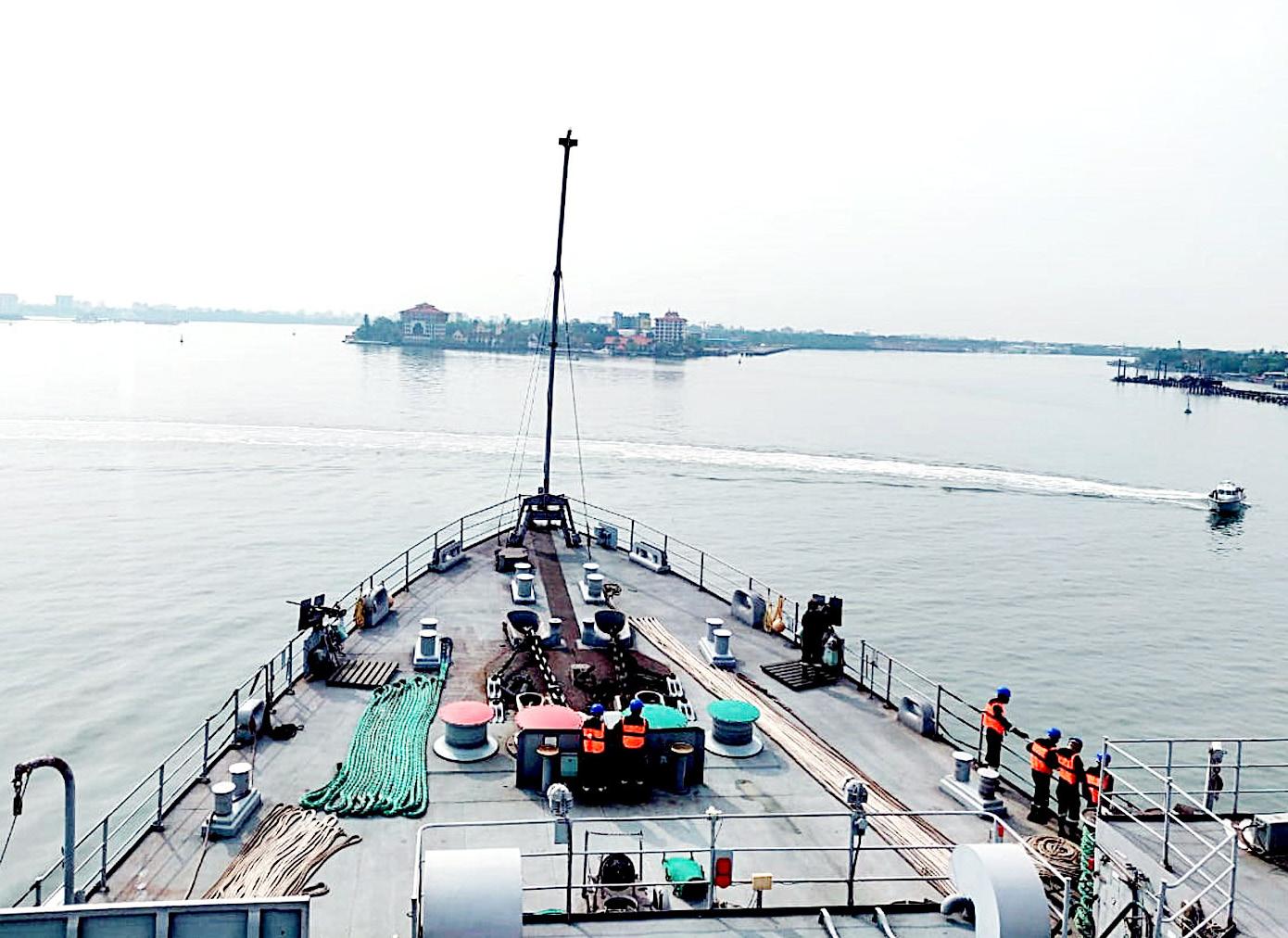
I started with some of my favourite poets, but almost before I knew it, we had poetry by 279 different poets writing in as many as 34 languages," Gulzar said in an audio message.
"I firmly believe that poetry doesn't know any borders, so, along with poets from Gujarat, Punjab, Kerala, Goa, Odisha, I included poets writing in Tamil in Sri Lanka, in Bangla in Bangladesh and in Urdu and Punjabi in Pakistan," he added.
"The poems appear in English translation, which is a language that, thanks to our history, a majority of Indians are familiar with. But I wished to make the poems my own, and to write them again in my own way in a language and idiom that is truly our own; therefore I transcreated the poems (except the ones that were originally writtenin Hindi or Urdu) in Hindustani, the language in which I write.
"This was a massive project but a very rewarding one too. The poetry of India can be truly known only if one takes into account the poetry of all its languages.
'A Poem a Day' is my tribute to the many languages of India that happen to be local yet form a part of our national identity. It is also a personal selection of the Indian poetry that contributed to my journey of becoming a poet, and the poetry that I have found the most memorable," he said.
Expressing his gratitude to Harper Collins India for undertaking this ambitious work and bringing it to readers everywhere, Gulzar added: "I feel we need poetry and the power of words more than ever in the difficult times we are going through; I hope that A Poem a Day will be a companion many of you will want to have by your side as we walk into the future."
Gulzar has been one of the most popular lyricists in mainstream Hindi cinema, gaining international fame when he won an Oscar and a Grammy for the song Jai ho. He received the Sahitya Akademi Award in 2002, the Padma Bhushan in 2004, and the Dadasaheb Phalke Award in 2014.
Indian-origin comedian wins Nickelodeon comedy award
South African comedian Preven Reddy was named the ‘African Social Media Star’ in the international category of the 33rd Annual Nickelodeon Kids Choice Awards, making him the awards’ only Indian-origin winner. Reddy is well-known on social media for his comic videos as “Aunty Shamilla”. In his videos, he puts on a South African-Indian accent unique to the greater Durban region which is home to almost half of the South Africa’s 1.4 million Indians.
Although it has been tagged offensive by some, the accent remains very popular amongst comedians and their audiences. Reddy was given the award in a virtual ceremony by the Nickelodeon channel.
"I have been crying happy tears all morning. We actually did it. Thank you so much to every single person who voted for me continuously. I am genuinely at a loss for words, this is so, so surreal. Thank you for believing in me South Africa," he said on his social media.
Big names that attended Nickelodeon’s virtual ceremony include Dwayne Johnson, Ariana Grande, Millie Bobby Brown and Ellen DeGeneres. The awards celebrate kids’ favourite media across films, television, pop music, music, and more.
Psychologists identify coronavirus-related disorder: ‘cyberchondria’
Psychologists at the Moti Lal Nehru (MLN) Divisional Hospital at Allahabad in India have identified a disorder called ‘cyberchondria’, the fear of falling prey to the coronavirus coupled with depression and anxiety. They say that it is made worse by access to excessive information on the Internet.
While anxiety can be good in helping us react with potential emergencies, too much anxiety can become overwhelming and cause problems, according to psychologists.
"People regularly look for information about symptoms on the internet to check their health status, which is absolutely fine. However, a large number of people who are overly distressed or anxious about their health, are seen making excessive or repeated health-related searches on the internet which makes them even more distressed. This is known as 'cyberchondria'," explained Dr Ishanya Raj, a psychologist at MLN Hospital.
According to the doctor, cyberchondria generally leads to higher degrees of stress which, in turn, can cause elevated blood pressure, headaches, muscle tension, and a weakened immune system. Often, it is triggered by an event - suffering a health scare, somebody in the family falling ill, or a famous person of their age dying or getting sick.
Dr Raj further explained, "In the present scenario, the pandemic is the only thing that people, and the media, are talking about. People tend to search the internet where they get incomplete information and this enhances the anxiety and fear. In fact, this complicates the problem instead of solving it."
According to the expert, the problem is greater in urban and semi-urban population that has access to internet.
Dr R.K. Sarkar, a psychiatrist in Kanpur, said that the problem was found mainly in tech-savvy youth.
He cited the example of a teenage boy whose parents had been consulting him almost on a daily basis because their son said he had coronavirus symptoms as per information found on the internet. The boy was checked up and is healthy but, apparently, is suffering from cyberchondria.
Dr. Sarkar advised that people should refrain from compulsive checking of the pandemic on the internet and also avoid watching television shows that talk about the scare.
"If a person suffers from a specific symptom for a few days, it would be advisable to get a professional's opinion on the matter because a doctor can provide more reliable information than an internet search," he said.
Canadian, Spanish students cycle 100km in Singapore to feed Mumbai migrants
In a unique initiative, a Canadian and a Spanish student, both of Chinese origin, cycled 100 km in Singapore to raise funds for migrants 4,000 km away in Mumbai’s Govandi suburb. The fund-raiser by Canadian Daren Xiao, 30, and Spanish national Ke Xu Zhou, 29, helped collect nearly (Singaporean) $1,700. Both the students at the INSEAD Business School in Singapore hope to achieve their target of $7,000 by May 15.
“Daren and Zhou completed the gruelling 100 kms cyclothon in Singapore to mark Daren’s birthday yesterday. They will continue to raise funds online for seven days,” Feeding From Far (FFF) initiative cofounder Paritosh Pant said.
In early April at the height of lockdown, FFF started as a small community kitchen project in Baiganwadi slum area of Govandi. In the past nearly six weeks since launch, it has dished out more than 400,000 meals to hungry and jobless migrants during the ongoing Covid-19 lockdown.
“The proposal was broached quite casually along with my friend and Adv. Pooja Reddy and we co-founded the FFF. People started helping us out and in the initial few days we got generous support from the legal fraternity of the Customs, Excise and Service Tax Appellate Tribunal, in the form of large individual donations to enable us kick-start the service,” said Pant, a graduate of the country’s premier catering institute, IHM Mumbai.
What was launched informally, has now turned into a serious care-giver for thousands of migrants trapped in the lockdown, as the FFF has collected funds of nearly Rs 1 crore from various quarters and it is comfortably placed to feed the migrants for the entire lockdown, he said.
“Presently, we are serving around 14,000 meals daily – 7,000 lunches and 7,000 suppers to daily wage earners who have lost their livelihoods – through a team of volunteers in the area. We are taking full precautions and adhere to all Covid-19 protocols for this,” Pant said.
The FFF community kitchen has come up in the Brihan Mumbai Municipal Corporation (BMC)’s Al Mahdi School in Bainganwadi, Govandi.
As word of FFF’s work spread, several celebs like Vishal Dadlani, Abish Mathew, Monica Dogra, Tanmay Bhat, Saba Azad, Rega Jha, Harish Iyer and others also chipped in for the cause of the migrants.
At one point, the Rotary Club of Bombay Powai also decided to associate with the humanitarian project and helped collect around Rs 50 lakh for the initiative, besides offers from others to join the initiative.










